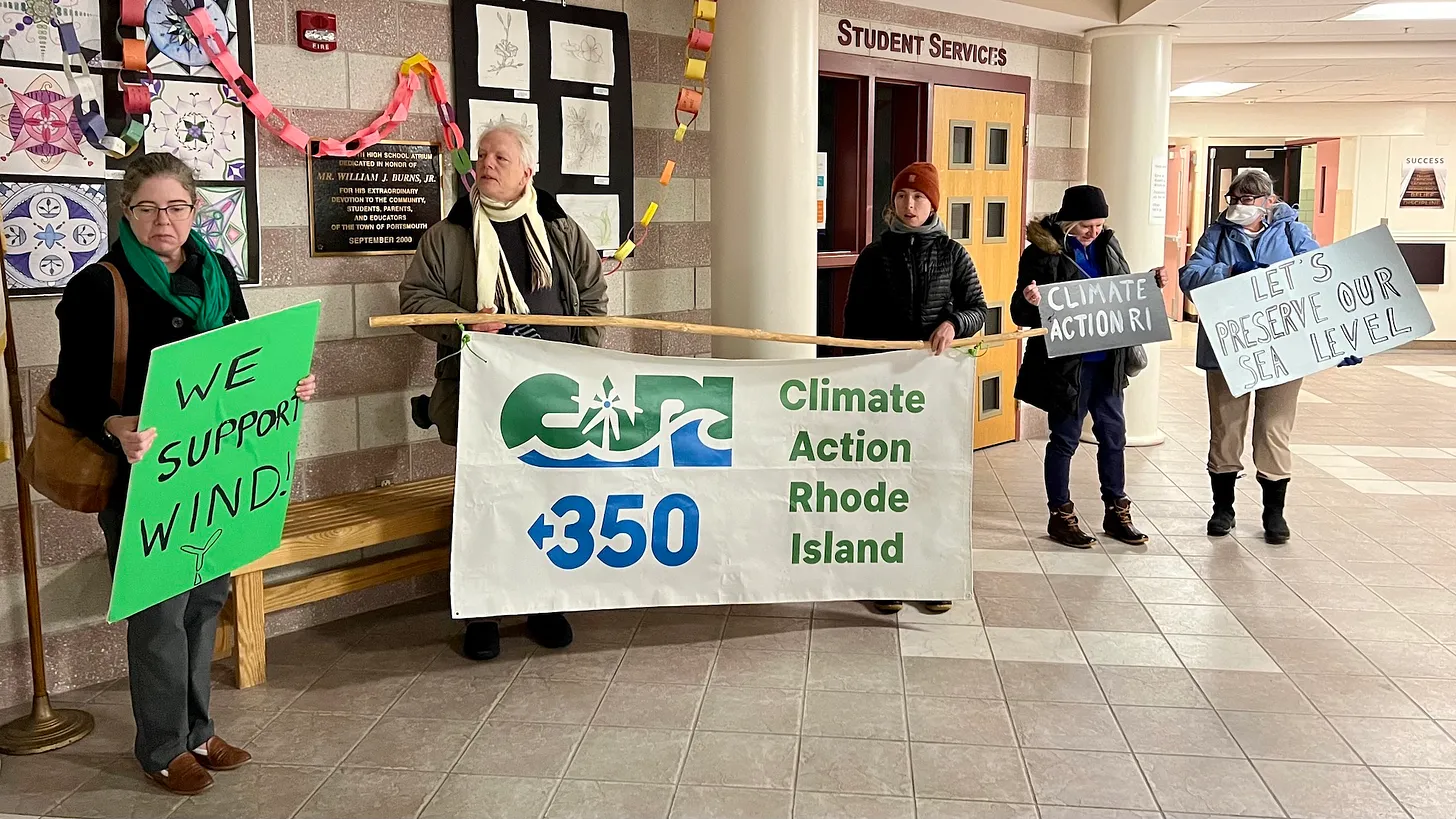Green Oceans and other climate denialists blasted for misinformation
Wind energy is an important component of the fossil fuel-free future the world needs to adopt to avoid the worst ravages of climate change. SouthCoast Wind Energy LLC (SouthCoast) is building wind turbines off Rhode Island's shoreline and needs to lay electrical cables in Rhode Island to get the power from the turbines and to the electrical grid.
The Portsmouth Town Council held a meeting on Tuesday to approve an agreement between the Town and SouthCoast. The agreement was worked out over several months by lawyers representing both parties.
In return for the company running
the cables from the turbines to the shore, the Town will be paid $23 million
over the next 20 years, with a nonrefundable upfront payment of $500K which the
Town gets to keep whether or not the project goes forward.
You can watch all the public comments from the meeting
here.
The final decision as to whether or not these wind turbines will be built is in the hands of Rhode Island's Energy Facilities Siting Board (EFSB). The Town of Portsmouth has no real power over whether or not the facility gets built. This is the function of the EFSB - to override any potential local opposition to projects like this.
Established by the Rhode Island General Assembly in 1986, for over 30 years the EFSB approved every fossil fuel power plant idea brought before it - until the Town of Burrillville successfully defeated Invenergy's $1 billion fracked gas and diesel oil burning power plant in 2019. [I wrote about the establishment of the EFSB here, and Invenergy’s historic loss before the EFSB here.]
One reason Invenergy lost?
Climate change. Renewables, like solar and wind, are entering the power markets
at rates that are competitive, or even superior, to fossil fuels. To satisfy
the energy needs of Rhode Island we no longer have to be dependent on fossil
fuels. This means lower costs for consumers and less dependence on energy
sources like oil and gas that are destroying the planet.
SouthCoast’s project is a part of this progression
towards a world without fossil fuels, but the fossil fuel industry is not going
to go quietly. Instead, pro-fossil-fuel advocacy groups are poisoning the
discourse with “skewed and cherry-picked facts, obstruction, denial, delay,
fake experts, conspiracy theories, and logical fallacies” to quote Mary
Lhowe at ecoRI.
Lhowe was writing about a report from Brown University’s Climate and Development Lab (CDL) and Climate Jobs RI that examined the claims
of Green
Oceans, which the report describes as “an anti-offshore wind group
in Little Compton, Rhode Island” which seems to be borrowing arguments from
“national climate disinformation organizations” to sow fear and confusion in
communities throughout Rhode Island.
And sadly, the disinformation campaign is working.
The misinformation peddled by Green Oceans and other
climate denialists set the stage for the contentious Portsmouth Town Council
meeting on Tuesday evening. Because of the expected crowds, the meeting was
held in the Portsmouth High School Auditorium. Dozens of Portsmouth
and greater Rhode Island residents spoke against the SouthCoast wind project,
telling the Town Council to reject any deal.
To counter this anti-wind position, members of Climate Action Rhode Island, an environmental group working to advance renewable energy projects in the state, also filled the auditorium and held signs outside the venue and in the lobby in support of wind energy and against the disinformation campaign of Green Oceans.
[Climate Action Rhode Island
recently protested outside the Preservation Society of Newport County’s
“Holiday Open House” over the Society's lawsuit against the construction of
wind turbines off the coast of Rhode Island.]
This set the stage for a confrontational hearing, where
people opposed to the project denied the existence of climate change or charged
that SouthCoast is owned and influenced by Communist China while those in favor
of the wind energy project spoke out for it. [To be clear: Climate change is
real and as far as I can tell, Communist China has no ownership stake in
SouthCoast.]
That said, the decision that needed to be made by the
Portsmouth Town Council was not about whether or not to approve SouthCoast's
wind project. The decision was to accept or reject the $23 million that
SouthCoast would pay the town to connect the wind project to the electrical
grid. The decision about whether or not to build the project is up the EFSB
and other state and federal regulators, and that decision will be made over the
next few months.
At the end of the meeting, the deal between the Town of
Portsmouth and SouthCoast was approved by the Town Council on a vote of 5-1.
Steve Ahlquist is a reader-supported publication. To
receive new posts and support my work, consider becoming a free or paid
subscriber.
